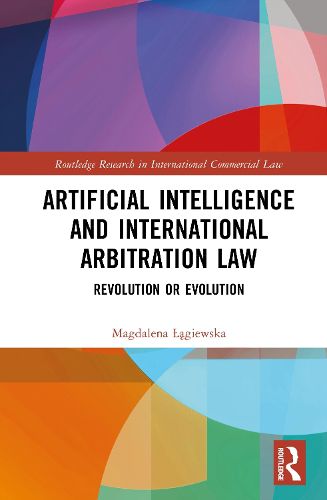Readings Newsletter
Become a Readings Member to make your shopping experience even easier.
Sign in or sign up for free!
You’re not far away from qualifying for FREE standard shipping within Australia
You’ve qualified for FREE standard shipping within Australia
The cart is loading…






The book asks whether the use of Artificial Intelligence (AI) and Generative AI (GenAI) in international arbitration represents a revolution or an evolution of the international dispute resolution landscape.
Critically engaging with the transformative impact of the Fourth Industrial Revolution (4IR), this book focuses on the integration of AI and GenAI into international commercial arbitration. Set against the backdrop of rapid technological advancement, it explores how arbitral tribunals and stakeholders are cautiously yet progressively adopting these innovations in a manner that respects and preserves the foundational principles of arbitration. Through an interdisciplinary and practice-oriented approach, the book examines the evolving role of AI in arbitration. It analyses how AI is perceived and applied by parties, arbitral institutions, and arbitrators, as well as assessing the legal frameworks in place to govern it. Offering a balanced analysis of both the opportunities and legal and ethical dilemmas posed by emerging technologies, the book asks if a duty of disclosure is relevant in relation to AI use, and what challenges this might entail. It also covers the status of AI-generated arbitral awards under international law, as well as copyright law.
This book will be of interest to researchers in the field of international arbitration and commercial law.
$9.00 standard shipping within Australia
FREE standard shipping within Australia for orders over $100.00
Express & International shipping calculated at checkout
The book asks whether the use of Artificial Intelligence (AI) and Generative AI (GenAI) in international arbitration represents a revolution or an evolution of the international dispute resolution landscape.
Critically engaging with the transformative impact of the Fourth Industrial Revolution (4IR), this book focuses on the integration of AI and GenAI into international commercial arbitration. Set against the backdrop of rapid technological advancement, it explores how arbitral tribunals and stakeholders are cautiously yet progressively adopting these innovations in a manner that respects and preserves the foundational principles of arbitration. Through an interdisciplinary and practice-oriented approach, the book examines the evolving role of AI in arbitration. It analyses how AI is perceived and applied by parties, arbitral institutions, and arbitrators, as well as assessing the legal frameworks in place to govern it. Offering a balanced analysis of both the opportunities and legal and ethical dilemmas posed by emerging technologies, the book asks if a duty of disclosure is relevant in relation to AI use, and what challenges this might entail. It also covers the status of AI-generated arbitral awards under international law, as well as copyright law.
This book will be of interest to researchers in the field of international arbitration and commercial law.